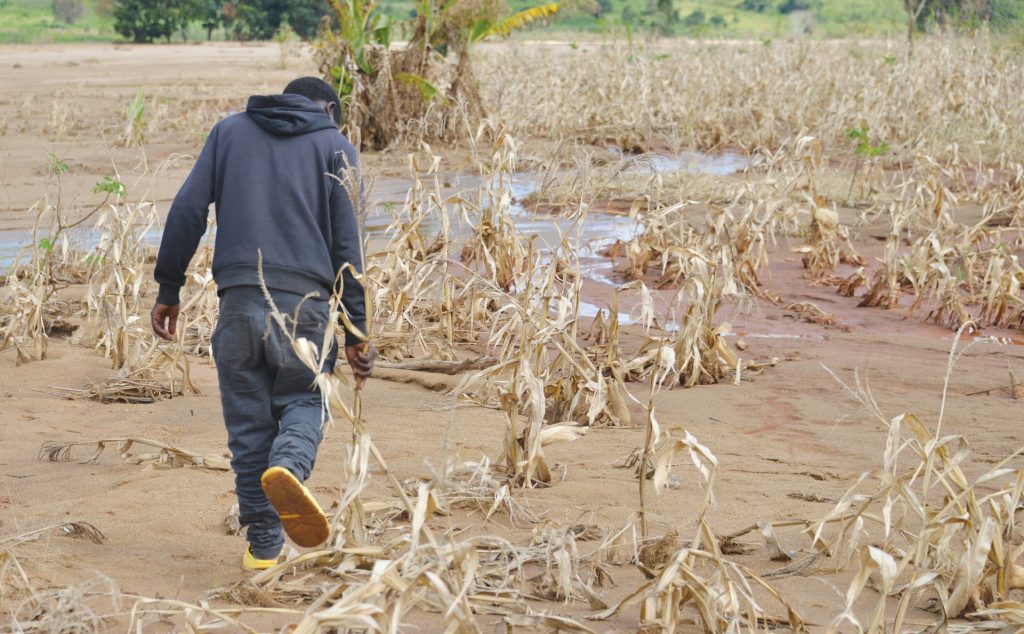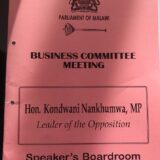Did you know that a farmer in Malawi loses up to 30 tonnes of topsoil per hectare (ha) every year?
This is one of the startling insights into soil health by the Ministry of Agriculture in partnership with the Food and Agriculture Organization of the United Nations.
A farmer inspects his crop damaged by Cyclone Freddy in Nanchidwa, Mulanje District
This means the fertile soil being washed away, especially from bare farmland the size of three football fields, is enough to fill a 30-tonne articulated truck seen on the roads of Malawi.
This paints a bleak future of the country’s economy, which hinges on agriculture, as crop yields keep dwindling due to loss of soil fertility and climate change.
The economy is sitting on a shaky foundation, warns agriculture policy analyst Tamani Nkhono-Mvula.
“Land degradation remains a serious challenge nationwide,” he says.
Most of the soil is scrapped by rainwater racing down bare fields that deck steep slopes, the FAO study shows.
Malawi has one of southern Africa’s fastest loss of trees, losing an average of 2.8 percent or 250 000ha of its forest cover per year.
The main losers are farmers who require healthy soils for bumper harvests.
Ester Mandala, a 38-year-old farmer from group village Ndala in Mulanje District, has seen run-offs and flash floods scraping topsoil that gifted her 30 bags of maize in 2020.
As the fertile soils vanished, the harvest dropped to 20 bags in 2021, nine in 2022 and only one bag in 2023.
The loss of soil was unmistakable in March 2023 when the floods triggered by Cyclone Freddy ripped her field to gullies, washing away maturing crops.
Now the woman and her five children rely on unpredictable food aid.
“The main tragedy is that we are losing fertile soil amid harsh effects of climate change,” she says. “If not, it’s a dry spell, then we get floods which wash our crops away as did Freddy.”
The effects include declining crop yields as well as food scarcity, nutrition insecurity and low household incomes.
The Malawi Vulnerability Assessment Committee reports that up to 3.8 million Malawians need urgent food aid to beat hunger until the next harvest in April.
This follows dwindling grain harvest.
The Ministry of Agriculture’s crop estimates show that maize production fell by 5.6 percent in the 2022/23 growing season to 3.5 million metric tonnes (MT) from 3.71 MT in the 2021/22 agricultural season.
Cyclone Freddy, which struck the Southern Region in March, further reduced the crop yields hit hard by shrinking land size, soil degradation, climate change and poor farming methods.
A 2023 Global Report on Food Crises published in May projects that extreme weather conditions would continue to undermine food security and expose 3.74 million Malawians to hunger.
The Malawi Humanitarian Situation report published in August this year, said between October 2023 and March 2024, it is anticipated that 4.4 million Malawians across all 28 districts will need more food to meet their annual needs.
This constitutes more than 22 percent of the country’s population of at least 20 million.
Currently, food security has been made worse by rising food prices and economic downturns, including the 44 percent kwacha devaluation.
But Nkhono-Mvula says Malawi does not lack information to help the agri-based nation conserve soil and end hunger.
“We have every document available to address our problems, but the challenge has been implementation,” he says.
Nkhono-Mvula says the country has enough policies against biting problems, including hunger and effects of soil degradation, but appears reluctant to make the documents work for the benefit of Malawians.
He explains: “The issues listed are among many affecting us, but if you look at the policy framework, Malawi has enough policies and well-articulated ones that should be able to address these challenges, but the only problem is that we are unable to implement these policies.
“It is difficult because we do not have the capacity, including human and financial resources, to implement our own plans. The second thing is lack of political will to implement long-term strategies to address food insecurity.”
Nkhono-Mvula lamented that the billions the country has spent on Affordable Inputs Programme (AIP) in three years could have brought better results if invested wisely. AIP mainly offers subsistence farmers access to subsidised fertiliser to boost their maize yields in their barren fields.
Nkhono-Mvula calls for the resumption of joint sector review meetings where various role players involved in agriculture brainstorm solutions to big issues.
He says: “The meetings which are supposed to be platforms for mutual accountability are no longer taking place. During these meetings we were looking at the progress made.
“Another problem is coordination of ministries. When addressing hunger, we need different ministries to work together.”
Asked what policies and strategies the government has put in place to conserve soil and increase food production as the number of mouths to be fed keeps surging, Secretary for Agriculture Dickxie Kampani said the first pillar of the Malawi 2063 long-term agenda emphasises on improved agricultural productivity and commercialisation.
“This pillar aims at increasing yield per hectare, more food and economic security towards food access. Irrigation will address issues of dry spell through supplemental irrigation during off-season and mega-farms will also contribute towards expanding hectare,” he said.
However, Kampani did not outline specific strategies to achieve this lofty goal by 2063, with soils getting breached every day as population is expected to more than double by 2050.n
Next: What lessons has Malawi learnt from frequent disasters?
The post Crop yields dwindle as climate crisis bites harvest first appeared on The Nation Online.
The post Crop yields dwindle as climate crisis bites harvest appeared first on The Nation Online.
 Moni Malawi
Moni Malawi 

